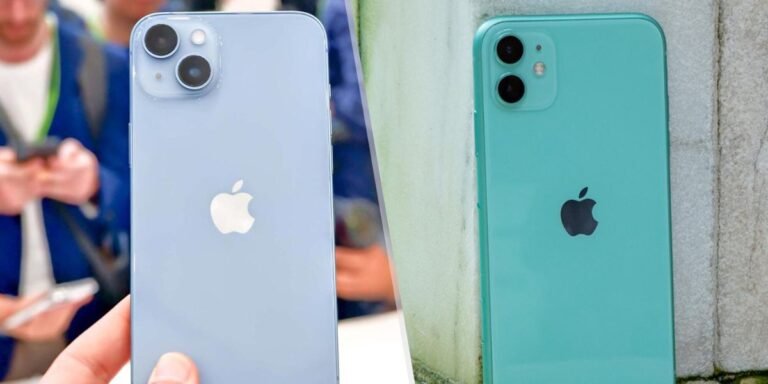When iPhone 11 vs 14 it comes to choosing the right iPhone model, Apple enthusiasts often find themselves torn between older models like the iPhone 11 and newer releases like the iPhone 14. With Apple’s regular upgrades to the iPhone series, each new model brings enhanced features, performance improvements, and aesthetic changes. But does the latest model always justify the upgrade, or does the iPhone 11 still hold its ground in terms of value and functionality?
In this article, we will break down the iPhone 11 vs 14, examining the key differences, performance benchmarks, and which phone might be best suited for your needs. We will also provide a comparison chart for a quick overview, and consider important factors like camera capabilities, battery life, design, and pricing.
iPhone 11 vs 14: Key Differences
Before diving into a detailed comparison, let’s look at the main differences between the iPhone 11 and iPhone 14. While both phones offer solid performance and a great user experience, Apple’s incremental improvements in newer models set the iPhone 14 apart in several key areas.
Design and Display
- iPhone 11: The iPhone 11 features a 6.1-inch Liquid Retina HD display with a resolution of 1792 x 828 pixels. While the display quality is good, it is not as sharp or vibrant as the newer models. The iPhone 11 also has a more traditional design, with larger bezels around the screen.
- iPhone 14: The iPhone 14 offers a slightly more refined design, featuring a 6.1-inch Super Retina XDR display with a resolution of 2532 x 1170 pixels. The display is brighter, sharper, and provides a better viewing experience. The bezels are thinner, and the overall design is more modern and sleek.
Key takeaway: The iPhone 14 offers a significantly better display, with higher resolution and brightness levels.
TRENDING:The Canyon of the Crescent Moon: A Hidden Gem in the Heart of Nature
Camera System
- iPhone 11: The iPhone 11 features a dual-camera system with a 12 MP wide and ultra-wide lens. It captures high-quality images and has Night Mode for better low-light performance. However, it lacks the advanced features found in later models.
- iPhone 14: The iPhone 14 comes with a more advanced dual-camera system, including a 12 MP wide lens with a larger sensor for better low-light performance, and a 12 MP ultra-wide lens. It also introduces new software enhancements such as Photonic Engine for improved color accuracy and Dynamic Island for interactive notifications. Additionally, the iPhone 14 supports 4K cinematic video recording with enhanced stabilization.
Key takeaway: The iPhone 14 has a more advanced camera system with enhanced features, especially for low-light photography and video recording.
Performance and Processor
- iPhone 11: The iPhone 11 is powered by the A13 Bionic chip, which was cutting-edge at the time of release. It provides smooth performance and is capable of handling most apps and games with ease.
- iPhone 14: The iPhone 14 is equipped with the A15 Bionic chip, which is more powerful and efficient. The A15 chip brings faster processing, better graphics performance, and improved energy efficiency, making the iPhone 14 significantly faster and more capable than the iPhone 11.
Key takeaway: The A15 Bionic chip in the iPhone 14 offers superior performance and energy efficiency compared to the A13 chip in the iPhone 11.
Battery Life
- iPhone 11: The iPhone 11 offers good battery life, typically lasting around 17 hours of video playback. While the battery is adequate for most users, it’s not as long-lasting as newer models.
- iPhone 14: The iPhone 14 has improved battery life, providing up to 20 hours of video playback. With its more energy-efficient A15 chip and optimized software, the iPhone 14 offers a noticeable improvement in battery performance over the iPhone 11.
Key takeaway: The iPhone 14 offers better battery life, lasting longer than the iPhone 11 on a single charge.
5G Connectivity
- iPhone 11: The iPhone 11 supports 4G LTE but lacks 5G capabilities, meaning it can’t take advantage of faster 5G networks.
- iPhone 14: The iPhone 14 is 5G-enabled, allowing it to connect to faster, more reliable 5G networks for quicker download speeds, lower latency, and better overall performance on supported networks.
Key takeaway: The iPhone 14 supports 5G, which is a significant improvement over the iPhone 11’s 4G LTE connectivity.
Software and Features
- iPhone 11: The iPhone 11 supports iOS 16, with access to all major features and updates provided by Apple. However, it does not have the newer software optimizations and features found in the iPhone 14.
- iPhone 14: The iPhone 14 runs iOS 16 (or later), benefiting from the latest software enhancements, including advanced security features, interactive notifications (via Dynamic Island), and better camera software. It also supports future iOS updates for a longer period.
Key takeaway: The iPhone 14 comes with the latest software features and will continue to receive updates for a longer period than the iPhone 11.
iPhone 11 vs 14: Price and Value
One of the most important considerations when deciding between the iPhone 11 and iPhone 14 is the price. Since the iPhone 14 is a newer model, it will generally be priced higher than the iPhone 11. However, with the iPhone 11’s more affordable price tag, it may still offer significant value for budget-conscious consumers who don’t need the latest features.
- iPhone 11 Price (2024): As of late 2024, the iPhone 11 can be found at a more budget-friendly price point, typically around $350 to $450, depending on storage and condition (new or refurbished).
- iPhone 14 Price (2024): The iPhone 14 is priced higher, with retail prices starting around $799 for the base model.
Key takeaway: The iPhone 11 provides better value for those on a budget or who don’t need the latest features, while the iPhone 14 justifies its higher price with newer technology and enhanced capabilities.
Comparison Chart: iPhone 11 vs 14
| Feature | iPhone 11 | iPhone 14 |
| Display | 6.1-inch Liquid Retina HD | 6.1-inch Super Retina XDR |
| Resolution | 1792 x 828 pixels | 2532 x 1170 pixels |
| Processor | A13 Bionic | A15 Bionic |
| Camera | Dual 12 MP (wide & ultra-wide) | Dual 12 MP (wide & ultra-wide) |
| Battery Life | Up to 17 hours video playback | Up to 20 hours video playback |
| 5G Connectivity | No 5G support | 5G support |
| Storage Options | 64GB, 128GB, 256GB | 128GB, 256GB, 512GB |
| Price (2024) | ~$350-$450 | ~$799 |
Which iPhone Should You Choose?
Choose the iPhone 11 if:
- You’re on a budget and don’t need the latest features.
- You’re satisfied with 4G LTE and don’t require 5G.
- You prefer a more affordable iPhone with good performance for everyday use.
- You are not heavily invested in mobile photography or video recording.
Choose the iPhone 14 if:
- You want the latest technology, including 5G, a better display, and advanced camera features.
- You prioritize battery life and want a more future-proof device.
- You use your phone for media consumption, gaming, or content creation and need more power.
- You plan on keeping your phone for several years and want to ensure you get the latest software updates.
Conclusion
Both the iPhone 11 and iPhone 14 offer great performance and a solid user experience, but they cater to different types of users. If you’re looking for an affordable device that still delivers strong performance, the iPhone 11 remains a good option. However, if you want the latest features, better performance, and future-proofing, the iPhone 14 is the clear winner.
Make sure to assess your specific needs and budget before making a decision, as both devices offer value in their own right.

